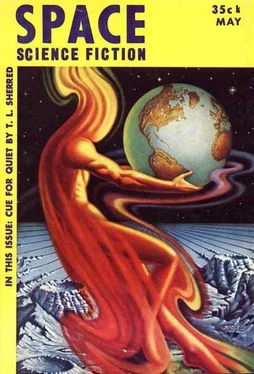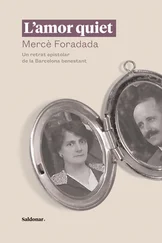Thomas Sherred - Cue for Quiet
Здесь есть возможность читать онлайн «Thomas Sherred - Cue for Quiet» весь текст электронной книги совершенно бесплатно (целиком полную версию без сокращений). В некоторых случаях можно слушать аудио, скачать через торрент в формате fb2 и присутствует краткое содержание. Год выпуска: 1953, Издательство: Space Science Fiction, Жанр: Фантастика и фэнтези, на английском языке. Описание произведения, (предисловие) а так же отзывы посетителей доступны на портале библиотеки ЛибКат.
- Название:Cue for Quiet
- Автор:
- Издательство:Space Science Fiction
- Жанр:
- Год:1953
- ISBN:нет данных
- Рейтинг книги:5 / 5. Голосов: 1
-
Избранное:Добавить в избранное
- Отзывы:
-
Ваша оценка:
- 100
- 1
- 2
- 3
- 4
- 5
Cue for Quiet: краткое содержание, описание и аннотация
Предлагаем к чтению аннотацию, описание, краткое содержание или предисловие (зависит от того, что написал сам автор книги «Cue for Quiet»). Если вы не нашли необходимую информацию о книге — напишите в комментариях, мы постараемся отыскать её.
Cue for Quiet — читать онлайн бесплатно полную книгу (весь текст) целиком
Ниже представлен текст книги, разбитый по страницам. Система сохранения места последней прочитанной страницы, позволяет с удобством читать онлайн бесплатно книгу «Cue for Quiet», без необходимости каждый раз заново искать на чём Вы остановились. Поставьте закладку, и сможете в любой момент перейти на страницу, на которой закончили чтение.
Интервал:
Закладка:
"Will you come this way, please?" and he led us down the hall.
The house was smaller than the outside had led me to expect. The builder had gone whole hog on the giant Greek columns and the wide sweep of the porch, and the inside of the house showed the results of the skimping. Not that it wasn't a far bigger and a far more expensive house than any average man would hope to have, but the limited space inside didn't go with those sweeping curves of the drive. I wondered who lived there.
The room where the doorman left us went with the inside of the house. So small it reminded me of the times when I tried to sell brushes during the depression, in Grosse Pointe, I expected every moment to have an underpaid maid, laundress, and butler come in to tell me that the lady of the house was out. In keeping with the faded appointments of the tiny room, a Chinese table held, for those who wait and read, an ancient collection of "Spur" and "Town and Country." As we sat and smoked, far off through the thin walls we could hear the soft rumble of voices. Occasionally a bass would rise above the sound, and a baritone would slide softly and soothingly across the pained roar. The front door opened and closed twice during the fifteen minutes or so we waited, and the footsteps that came in went past our room and pattered further down the hall. Each time, when the steps were out of reach of hearing, another door would open, and the distant voices would become almost distinguishable until the door again was shut. I looked curiously around the walls. Decorated with prints and pictures they were, yes, but with that faded permanency that to me spells the furnished house. The rugs were worn, worn to the shredding point, worn until the spurious Oriental design seemed an eerie Dali drawing. All it needed was the faroff smell of secondhand ham and cabbage.
The doorman slipped in and beckoned to us, a grim conspirator if ever I saw one. We followed him back to the entrance hall, back, back, to where the voices grew louder at every step. A double door-golden oak, or I don't know wood-barred the end of the hall, and the young fellow preceded us to throw it open with a semi-flourish. We walked in.
The place was blue with smoke. That was the first thing we saw. Lights there were in plenty, hanging around, hanging over the great oval table in the center of the room in a fiery glitter of glassy brilliants. The room was enormous, and I began to realize why this house was still in existence. Who cares about rugs if there is just one single room in the house where a ball or a party could be comfortably accommodated. Or a conference. I didn't know whose name appeared on the tax bills, but I would bet that it would be any other name besides the United States Government.
No group of men or women could produce that much smoke in a short time. That meeting had been going on for hours. As we stepped in through the double doors I tried to pick out anyone I knew, but the glare flickered in my eyes and I saw no face as more than just a pale blur against a background of tenuous blue. Tentatively I got inside the doors and they shut behind me with an abrupt finality. Two steps forward, three, four, five, and Stein drifted away from my side, away from the eyes that grew in size as I got closer to the table rim, toward the vacant chairs I saw slightly pulled away and ready for occupants. I stumbled over nothing and a reassuring hand touched mine. I felt callow, self-conscious, awkward. I never thought I'd be so glad to see Old Man Smith.
He stood alongside me as I sank gratefully into my ready chair. "Gentlemen," he announced quietly, "Mr. Peter A. Miller."
I half-bowed automatically, the proper thing to do, and the Old Man gave me his moral support by sitting next to me. He leaned over to say, "I won't introduce you formally. Point out who you want to know and I'll tell you who he is."
"Okay," I muttered, and felt in my pockets for cigarettes. I had to do something with my hands. I blew a cloud into the air and felt better. Settled back into the chair, I sent my glance around the table. Did I know anyone there?
At my right, the Old Man. His suit was wrinkled and his eyes were red-rimmed and tired. The large paper pad in front of him was covered with crisscross lines. On his right, a quite old man, bald and beetle-browed. His collar was open and wrinkled, his vest twisted under the lapel of his coat. I leaned toward Smith, and indicated his companion with my eyes.
"Morgan, Undersecretary of State," he said softly.
Morgan heard his name spoken, and shot a questioning glance my way. He realized what had been said and the beetlebrows slid upwards in a movement meant to be conciliatory. He bobbed his head with a cursory jerk and went back to staring across the table. I followed his glance.
The object of his affections seemed to be-yes, it was. Five-Star General Oliver P. Legree, not so affectionately called Simon by the men who served under him. I had been one of them. Trim and rigid and oh, so military he was, the very figure of a modern five-star general. His poker-stiff back thrust the tiers of ribbons to a sparkling glitter under the tinkling glare of the massive chandelier overhead. His face-well, it's been in enough rotogravures worldwide. The cigar was there, the big black cigar he never lit and never lost. His trademark was that cigar; his trademark was that and his jutting jaw that to everyone but his compatriots spelled determination and grit. To his staff and his men-me-it meant an ill-fitting lower plate.
That prognathous jaw was tilted, aimed at Morgan, and Morgan knew it. What had gone on just before I had come in? Just as I started to turn my glance away, the General threw his famous scowl directly at me. For one long second our eyes clung, almost glared. Then, without a sign of emotion or recognition he went back to staring at the Undersecretary with an intensity almost violent. Shaken back into self-consciousness by that grim stare I tried to fit together some of the other faces about the table.
–
Admiral Mason-Nason-Lacey-Admiral Lacey. I'd met him just a few days before, in that ill-fated conference in the White House. What was the other name? Jessop. He was there, too, alongside Lacey. But where was the Army, outside of Simon Legree? That was like Simon, at that. Let the Navy stick together; Legree was the General , and as such was himself the Army.
Who were the others? I knew none of them, certainly, although some trick of memory made me sure that I had seen or heard of them before. Like faces in an old school album they presented themselves to me, and for a long fraction of a minute I delved deep, trying to recall. A voice, that deep barking bass I had heard while waiting, boomed across the table.
"Mr. Morgan!" and the table seemed to quiver. "Mr. Morgan!" and the tenseness seemed to flow back into that huge room like a warm current. The Old Man leaned over and answered my unspoken question.
"Senator Suggs, Foreign Affairs Chairman."
I eyed the redoubtable senator. Short, swarthy skin that belied all his ranted racial theories, hair that straggled by intent over his weak green eyes, and a chin that retreated and quivered and joggled in time with his twitching adolescent eyebrows. Six solid terms in the Senate; six solid terms of appealing to the highest in theory and the lowest in fact; six terms of seniority for the chairmanship of committees far too important for a bigot; six terms of Suggs, Suggs, Suggs. The bass rumbled on.
"We're no further ahead, Morgan, than we were two hours ago. This, definitely cannot go on, if it has to be taken to the people themselves."
Morgan pondered well before he answered, and the room stilled.
"Senator," he said at last; "this is right now in the hands of the people, if you consider that you are one of the elected representatives, and the rest of us are chosen, with one exception, by those same elected representatives. The exception, naturally, is Mr. Miller."
Читать дальшеИнтервал:
Закладка:
Похожие книги на «Cue for Quiet»
Представляем Вашему вниманию похожие книги на «Cue for Quiet» списком для выбора. Мы отобрали схожую по названию и смыслу литературу в надежде предоставить читателям больше вариантов отыскать новые, интересные, ещё непрочитанные произведения.
Обсуждение, отзывы о книге «Cue for Quiet» и просто собственные мнения читателей. Оставьте ваши комментарии, напишите, что Вы думаете о произведении, его смысле или главных героях. Укажите что конкретно понравилось, а что нет, и почему Вы так считаете.












